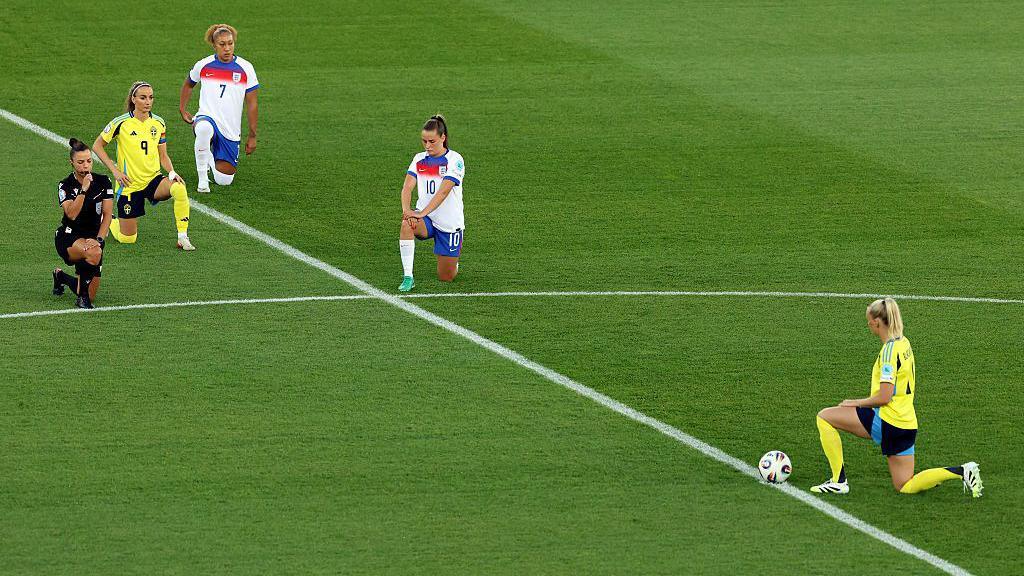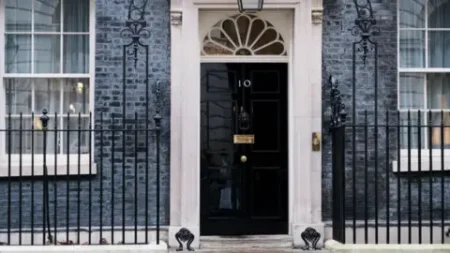The decision by the England Women’s football team, also known as the Lionesses, to discontinue the gesture of taking a knee before matches has sparked significant discussion and concern, particularly regarding the ongoing issue of racism. On Sunday, the Lionesses announced their intention to halt this symbolic act, aimed at combating racism, stating that it became evident that new approaches were necessary in tackling this pressing societal issue.
The backdrop to this decision was further highlighted when Jess Carter, a defender for the Lionesses, suffered racist abuse on social media platforms. The Football Association (FA) is backing the Lionesses’ decision, echoing their sentiment that a different approach is now needed to effectively address racism in football.
Piara Powar, the executive director of Fare, an organization focused on anti-discrimination in football, expressed his disappointment with England’s choice to stop taking the knee. He stated that while the players have the right to make that decision, he does not see a direct correlation between the team stopping the gesture and the racist abuse suffered by Carter. He emphasized that taking the knee has been a significant gesture within European football, illustrating powerful leadership and unity against racism. Powar insisted that stronger actions are needed to confront the ongoing issues of racism that persist in the sport and society as a whole.
In an important legislative context, the Online Safety Act was initiated in October 2023. This mandate requires social media platforms to take responsibility for protecting users from harmful content, including racism and hate speech. In light of Carter’s racial abuse, Powar reiterated the responsibility of social media platforms to take significant measures against users who perpetrate such hateful behaviors. He criticized the apparent lack of progress from platforms following the implementation of the Online Safety Act, indicating that the act has not yet resulted in visible actions against harmful content.
In addition, the United Kingdom Football Policing Unit (UKFPU) has confirmed that they are investigating the complaints related to Carter’s racist abuse. They underscored their commitment to treating reports of hate crime seriously, collaborating with Carter’s family and social media firms, including major platforms like Meta (formerly Facebook) and X (formerly Twitter), to pinpoint and address the individuals responsible for the abusive messages.
While the Lionesses are aiming to shift their approach to anti-racism actions, other prominent figures within the anti-racism movement have weighed in on the matter as well. Shaista Aziz, co-director of The Three Hijabis, a campaign formed in response to racism witnessed during the men’s Euro 2021, hailed the Lionesses’ decision as significant. She explained that the gesture of taking a knee, which has origins in the civil rights movement, has been diluted by individuals who misuse its significance, perpetuating division and “woke” culture in football. By moving beyond the gesture, the Lionesses are purportedly taking ownership of the narrative surrounding racism in football, indicating that simply taking a knee is no longer sufficient.
UK Prime Minister Sir Keir Starmer has echoed similar sentiments, asserting that racism has no place in football or society, and expressed solidarity with Jess Carter and all players facing such issues. Meanwhile, Sanjay Bhandari, the chairman of the anti-discrimination group Kick It Out, has called for increased accountability and action from social media companies, which he claims have regressed in their efforts to combat online hatred over the years.
The nature of the abuse directed towards players like Carter is not an isolated incident. Such racial discrimination has plagued the women’s game for years, with many prominent players receiving similar backlash during critical moments in their careers. It highlights a persistent and troubling trend within the sport, further emphasizing the need for effective, actionable strategies to combat racism beyond gestures.
As discussions around the Lionesses’ decision and the systemic racism within football continue, it is crucial to consider the larger implications for the sport and society at large. The shift away from taking the knee could pave the way for more rooted actions in the fight against racism, but the effectiveness of these new strategies remains to be seen. Ultimately, the football community must rally around a more robust and sustained approach to dismantling the structures of racism that persist both on and off the pitch.











